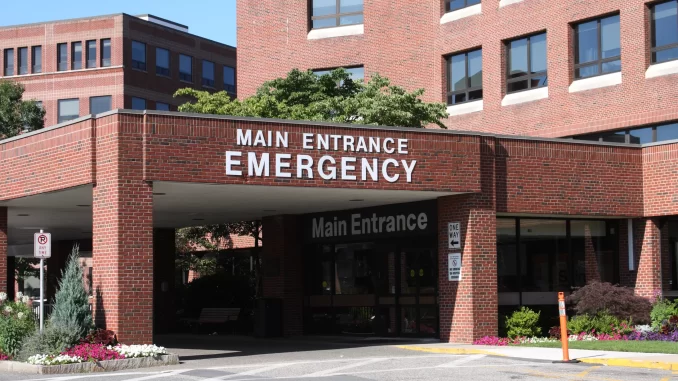
U.S. Representative Nick LaLota (R-Hauppauge) introduced the Save Our Safety-Net Hospitals Act on August 13, a bipartisan bill that he says would prevent massive cuts to New York hospitals’ Medicaid payments.
He introduced the bill with fellow New York Representative Yvette Clarke (D-Brooklyn), and was joined by Representatives Larry Bucshon, M.D. (R-IN), Doris Matsui (D-CA), Mike Lawler (R-NY), and Frank Mrvan (D-IN). The bill is supported by America’s Essential Hospitals, the Healthcare Association of New York State (HANYS), the Suburban Hospital Alliance of NYS, the Alliance of Safety-Net Hospitals, Nassau-Suffolk Hospital Council, and the Greater New York Hospital Association (GNYHA).
Medicaid Disproportionate Share Hospital (DSH) funding helps preserve access to care at hospitals and health systems that serve the most vulnerable populations. All New York hospitals receive some level of Medicaid DSH funding. Many hospitals rely on this funding to remain operational. DSH caps determine the maximum amount of federal Medicaid DSH funding a hospital can receive. The amount of capped DSH funding has traditionally been based on the financial losses from services provided to uninsured patients, Medicaid enrollees and dual-eligible enrollees (Medicaid patients who also have Medicare or other third-party coverage).
This legislation would mitigate the unintended impact of a provision included in the FY21 Consolidated Appropriations bill. Specifically, it defines the Medicaid shortfall component of the DSH cap to include costs and payments for patients for whom Medicaid is the primary payer, plus unreimbursed costs associated with Medicare duals (if any), plus unreimbursed costs associated with all other duals (if any).
LaLota pointed out Stony Brook University Hospital is facing a potential $53 million cut this year.
“New York’s safety-net hospitals, like Stony Brook University Hospital, are the backbone of our healthcare system, providing essential care to our most vulnerable communities. The potential $53 million cut in Medicaid funding threatens the very foundation of these institutions,” LaLota said. “My bipartisan Save Our Safety-Net Hospitals Act would prevent massive cuts to the nation’s most vulnerable hospitals without any cost to the taxpayer and ensure they can continue to deliver critical services. This is a bipartisan and common sense fix to an issue directly impacting hospitals on Long Island and safeguards healthcare access for those who need it most, ensuring that no one is left behind due to bureaucratic oversights.”
“New York’s safety net hospitals are an invaluable resource for our state's most vulnerable patients, and Medicaid DSH funding is necessary for keeping their operations running,” said Clarke. “We cannot stand by as devastating funding cuts loom and threaten the health, wellbeing, and futures of the millions of New Yorkers who rely on these vital hospitals to access the healthcare services they need. I am proud to stand with my colleagues across the aisle in support of a solution that will keep their doors open and protect the underserved patients they care for. The time to pass the SOS Hospitals Act is now.”
“I am grateful to Rep. LaLota for introducing this critical piece of legislation to protect our nations safety-net hospitals providing quality care to the patients most in need,” “If Sec. 203 is not amended, Stony Brook University Hospital will incur a $53 million reduction in revenue this fiscal year and that reduction will continue to grow into the future,” said Carol Gomes, Stony Brook University Hospital CEO and COO. “I am urging Congress to support and pass this essential amendment now.”
“[This bill] would safeguard resources essential to preserving care for New York’s most vulnerable populations,” said Bea Grause, RN, JD, president of the Healthcare Association of New York State (HANYS). “This bipartisan legislation would fix an inadvertent cut of Medicaid DSH resources for some New York hospitals that treat a significant portion of Medicaid and Medicare patients.”
“This legislation takes an important step toward righting a wrong,” said Wendy Darwell, CEO of the Suburban Hospital Alliance of New York State. “The DSH program compensates hospitals or the extraordinary costs they incur for caring for our most vulnerable residents. Three years ago, a minor change in law significantly reduced what New York’s hospitals could receive under
the program. Care provided to those who qualify for both Medicare and Medicaid – typically very low-income seniors and the disabled – was no longer counted. The consequence of that change is tens of millions of dollars in cuts to Stony Brook, NUMC, and other public hospitals in New York.”
“[T]he current DSH cap calculation will severely harm them financially and disrupt access to care,” said Kenneth E. Raske, President of the Greater New York Hospital Association. “The Save Our Safety Net Hospitals Act will help ensure that safety net hospitals can continue to serve the most vulnerable patients and communities. The entire hospital community strongly supports
this bill.”
“Medicaid DSH payments are a lifeline for many safety-net hospitals and the Save our Safety-Net Hospitals Act recognizes the uncompensated costs incurred by the hospitals serving patients who are dually-eligible for both Medicare and Medicaid,” said Ellen Kugler, executive director of the Alliance of Safety-Net Hospitals.


Be the first to comment